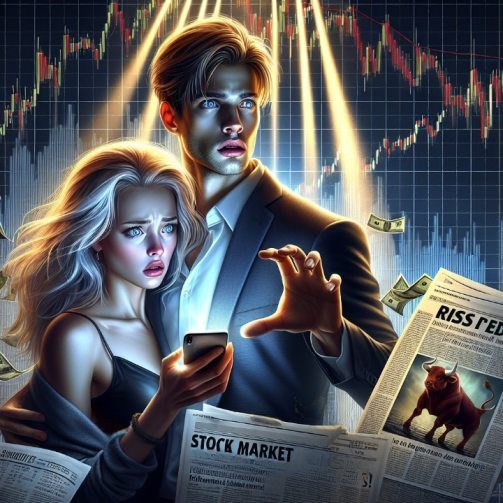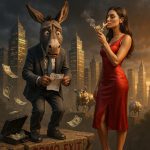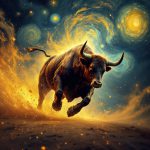Stock Market Chaos: The Peril of Ignorance and Misinformation
Dec 28, 2024
The Folly of the Masses
Throughout history, the stock market has been a treacherous landscape, sprinkled with the shattered dreams of the ignorant and uninformed. From the South Sea Bubble to the Tulip Mania and the countless disasters since, the masses have consistently proven their inability to learn from the past. They stumble blindly, like lemmings marching towards the cliff’s edge, driven by greed and fear, only to fall into the same traps that ensnared their ancestors. It is a tragic tale of stupidity, repeated ad nauseam.
“The greatest penalty of evildoing is to grow into the likeness of bad men.” – Plato
The masses have grown into fools’ likenesses in pursuing quick riches. They buy when the market is euphoric, driven by delusions of grandeur. They sell in a panic, consumed by fear and despair. Like retards, morons, and jackasses, they cry and wail, but they never learn. With each market crash, they repeat the mistakes of their ancestors, indicating that they have learned absolutely nothing.
The Masters’ Wisdom Ignored
The wisdom of the ages, handed down by great thinkers and investors, is lost on the masses. Machiavelli, the master of strategy, understood their folly:
“Men are so simple and so much inclined to obey immediate needs that a deceiver will never lack victims for his deceptions.” – Machiavelli
With its promise of wealth, the stock market is the ultimate deceiver. It lures the greedy and the ignorant, only to dash their dreams against the rocks of reality. Mark Twain, with his signature wit, saw through their foolishness:
“It ain’t what you don’t know that gets you into trouble. It’s what you know for sure that just ain’t so.” – Mark Twain
The masses are convinced they know the secrets of the market. They follow gurus, chase trends, and fall for get-rich-quick schemes. But their certainty is their downfall, as the market always reveals the truth.
Buying High and Selling Low
The ignorant and uninformed consistently demonstrate their inability to time the market. They buy when the market is at its peak, driven by euphoria and the illusion of invincibility. They sell in a panic, at the bottom, consumed by fear and regret. Confucius, the ancient Chinese philosopher, would shake his head in dismay:
“Real knowledge is to know the extent of one’s ignorance.” – Confucius
In their ignorance, the masses believe they know when the market has hit its peak or bottom. They fail to recognize that their emotions cloud their judgment, leading them astray. Their buying and selling decisions are based on herd mentality, following the crowd off a cliff.
A Tale of Two Bubbles
The South Sea Bubble and the Tulip Mania are stark reminders of the madness of crowds. In the early 1700s, the South Sea Company enticed investors with its grandiose promises, leading to a speculative frenzy. The masses, driven by greed, bought into the hype, only to see their fortunes evaporate when the bubble burst.
“The first method for estimating the intelligence of a ruler is to look at the men he has around him.” – Machiavelli
In their pursuit of easy money, the masses failed to heed the warnings of the wise. They ignored the fundamentals, choosing instead to follow the herd. The same folly played out during the Tulip Mania in the 1600s when a single tulip bulb commanded absurdly high prices. The masses, driven by FOMO (Fear of Missing Out), bought at the top, only to be left holding worthless bulbs when the bubble burst.
Recent Disasters, Same Old Story
Fast-forward to recent times, and the story remains unchanged. The Dotcom Bubble of the late 1990s and the Subprime Mortgage Crisis of 2008 are testaments to the masses’ inability to learn. Driven by greed and the fear of missing out, they piled into tech stocks and risky mortgage-backed securities, only to be crushed when the bubbles burst.
“A wise man adapts himself to circumstances, as water shapes itself to the vessel that contains it.” – Machiavelli
The wise investor, however, adapts to changing circumstances. They recognize the signs of a bubble and act accordingly. They buy when the crowd is panic-selling and sell when the crowd is euphoric. They understand that disasters and crashes create once-in-a-lifetime opportunities.
The Asian Currency Crisis: A Case Study
The Asian Currency Crisis of the 1990s is a prime example of how the masses’ ignorance led to their downfall. As Southeast Asian economies crumbled, the masses, driven by fear, sold their assets at fire-sale prices. However, the wise investor saw the crisis as a buying opportunity. They understood that the region’s long-term potential remained intact, and they bought when blood was running in the streets.
“Be fearful when others are greedy, and greedy when others are fearful.” – Warren Buffett
The wise investor knows that market crashes are a time to buy, not sell. They embrace contrarianism, going against the herd. While the masses panic, the wise investor calmly accumulates quality assets at bargain prices.
The Perma-Bears: A Special Kind of Stupid
Among the ignorant and uninformed, a special breed emerges, the Perma-Bears. These stubbornly pessimistic souls defy the very essence of market trends. They insist the market will always go down, ignoring the lessons of history and human nature. Their mindset reflects a unique brand of stupidity, as Mark Twain might describe it.
“The trend is your friend; the rest is just noise.” – Sol Palha
The Perma-Bears refuse to acknowledge the power of the trend. They are like swimmers fighting against the tide, destined to exhaust themselves in a futile struggle. John C. Bogle, the founder of Vanguard, had a message for them:
“Don’t look for the needle in the haystack. Just buy the haystack!” – John C. Bogle
The Perma-Bears, however, insist on searching for that elusive needle, missing the bounty that lies within the haystack of bullish opportunities. Their myopia rivals Mr. Magoo’s, and their pessimism would make Eeyore proud.
Mass Psychology: A Force to Behold
In their collective behaviour, the masses create sentiments shaping the financial landscape. Their emotions, fears, and desires drive the markets’ currents. To understand mass psychology is to harness the power to navigate these waters effectively. The great investor John Templeton understood this well:
“Bull markets are born on pessimism, grow on scepticism, mature on optimism, and die on euphoria.” – John Templeton
In their optimism, the masses sow the seeds of their downfall. Their euphoria leads to overvaluation, creating opportunities for the astute investor to profit from their excesses. The wise investor embraces contrarianism, buying when the crowd is selling and selling when they are buying.
A Simple Solution: Mass Psychology 101
So, how can the average investor avoid the traps that ensnare the masses? The answer lies in understanding mass psychology and adopting a contrarian approach. By studying the collective behaviour of the market participants, one can identify opportunities that the masses overlook.
“The crowd is often wrong, and their emotional reactions can create purchase or selling opportunities for the astute investor.” – Anonymous
When the crowd is in a state of panic, it is a signal to buy. Their fear drives down prices, creating bargain opportunities. Conversely, when the crowd is euphoric, it is a sign to sell, as their greed pushes prices to unsustainable levels.
The wise investor embraces market crashes and corrections, recognizing them as opportunities to buy discounted-quality assets. They understand that the market is cyclical and that an upturn follows every downturn. As the ancient Chinese general Sun Tzu advised:
“The supreme art of war is to subdue the enemy without fighting.” – Sun Tzu
The enemy, in this case, is our fear and greed. We can emerge victorious by mastering our emotions and acting contrary to the crowd.
Lessons from History: A Bullish Perspective
History is replete with examples of how disasters and stock market crashes create bullish opportunities. The wise investor approaches these events excitedly, knowing they provide a chance to break free from the crowd and build wealth.
The Asian Currency Crisis of the 1990s is a case in point. While the masses panicked and sold, the astute investor saw the crisis as a buying opportunity. They understood that the region’s economic fundamentals remained strong, and their patience was rewarded as the markets recovered.
The same holds for the Dotcom Bubble and the Subprime Mortgage Crisis. The wise investor, recognizing the excesses and irrationality of the crowd, sold when the markets were euphoric and bought when fear reigned. They understood these events were necessary corrections, creating opportunities to acquire quality assets at bargain prices.
The ignorant and uninformed often lack the discipline to wait for the right opportunities. They are driven by short-term thinking and emotional decision-making. In contrast, the wise investor embraces patience and discipline. They understand that wealth creation in the stock market is a marathon, not a sprint.
“The stock market is a device for transferring money from the impatient to the patient.” – Warren Buffett
In their impatience, the masses try to time the market, chasing short-term gains. But their efforts are akin to trying to catch a falling knife. Conversely, the wise investor waits patiently for the right opportunities, knowing that the market will present them in due time.
“It is not because things are difficult that we do not dare, it is because we do not dare that things are difficult.” – Seneca
The stock market is tricky, and it takes courage to face its challenges. The ignorant and uninformed lack the courage to confront their fears; thus, they fall prey to their weaknesses. The wise investor, however, embraces the challenge, knowing that the rewards are worth the effort.
Conclusion: Breaking Free from the Chaos
In conclusion, the stock market is a chaotic arena where the ignorant and uninformed are doomed to repeat the mistakes of their ancestors. Their failure to learn from history condemns them to financial ruin. But for the wise investor, it is a playground of opportunities.
“The trend is your friend until the end, when it bends.” – Jesse Livermore
The wise investor understands the power of the trend and uses it to their advantage. They buy when the crowd is fearful and sell when they are greedy. They recognize that the crowd is often wrong, and their emotions are their worst enemy.
By embracing education, discipline, and a contrarian mindset, investors can break free from chaos and build financial independence. They can rise above the masses, using the market’s volatility to their advantage. This path requires courage, patience, and the wisdom to learn from history.
So, let the masses stumble and wail, for they are doomed to repeat their mistakes. Armed with knowledge and mental fortitude, the wise investor will navigate the ups and downs, seizing opportunities that the ignorant and uninformed cannot see.















